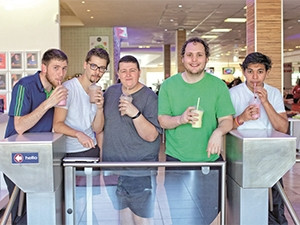
It was August 2015 and the chilly winter left many South Africans unwilling to stick their toes out of their warm beds and head out into the cold for a session at the gym. Just five more minutes turned into another hour under the covers and another day where the closest anyone came to the gym was driving past it in traffic.
People are battling with time and energy and often just wander into the gym, tap their cards at the counter and walk out again. They gained their points for exercise, kept their contract running and made sure their health insurer's wellness programme saw them as energetic gym bunnies doing their bit for health. It's a common story and one that nearly every other South African has heard at least once. It's also likely that the ingenuity of five students may have just brought this trend to an end.
The Discovery GradHack held at JoziHub in Milpark from 27 to 29 July saw a number of students in engineering, IT and sciences, many of them Honours students, come together to create remarkable solutions in just 24 hours. They were given a choice of category and just two days to come up with something that could transform and change. The winning team was made up of five third-year software engineering students from the University of Johannesburg (UJ) - Wald Bezuidenhout, Kyle Welsh, Michael Brooke, Waseem Nabi and Ross Guy - and aptly named the Red Hot Techie Peppers.
"It was such an incredible opportunity and one we highly recommend that all undergraduate students in IT take part in," says Brooke. "It challenges you, makes you see what you can cope with and gives you a chance to really see what it's like out there in the real world. If you're an IT person, do a hackathon - not only will you find out how you and your team can work together, but it's a chance to boost your career."
A sweaty truth
It's certainly doing just that for these five young minds from UJ. Not only did they come together as a team, working as a unified whole towards a common goal without in-fighting or tension, but they managed to deliver a working, fully-integrated, industry-level project centred on a cloud database with a back-end API within the cut-off time. What makes this achievement even more impressive is that the five were self-taught on mobile development and the languages they used in the final product.
"We built the complete solution in 24 hours," says Brooke. "The entire hackathon gives you only two days to create and flesh out your ideas and they provide you with the food and drinks you need to keep you going throughout. We worked through the days and then kept on coding back at the hotel."
Sleep is for the weak
It was an impressive achievement and saw the team get a maximum of three hours of sleep over the entire event. What it really drove home for the students was how well they worked together and how it has given them a chance to really test their mettle.
"It's difficult to assess how you will work in a real-world situation when you're a student and we really pulled it together," says Brooke. "We worked well together and stayed together. We handled the pressure, kept cool heads and our solution worked."
Already headhunted by Discovery, the Peppers have shown how well they can handle a brief, a tight deadline and a mixed bag of personalities. They also demonstrated the value of technology in resolving many of the issues that face organisations today.
"We think the technology we used was a big reason why we won. We could show everyone how simply swiping an Android phone on a machine's NFC tag fed the exercise stats into our live website feed," says Brooke. "They could see a live dashboard of exercise statistics on the mobile Android app as well as the browser front-end."
If the app is taken on by Discovery, it could well see an end to the days when people just dive in and out of the gym to get their points. Now, the app will tell the gym-goer's mobile phone exactly how much exercise took place between the gym entry and exit and let the wellness programme know precisely what is going on.
"It still needs to be bug-checked and has to be fleshed out, but it's pretty good for only 24 hours of coding," says Brooke. "It was an incredible opportunity for us to really push our boundaries and create something that is of use to people. We wanted to find a way of helping people get fitter and I think we achieved this and so much more!"
This article was first published in Brainstorm magazine. Click here to read the complete article at the Brainstorm website.
Share